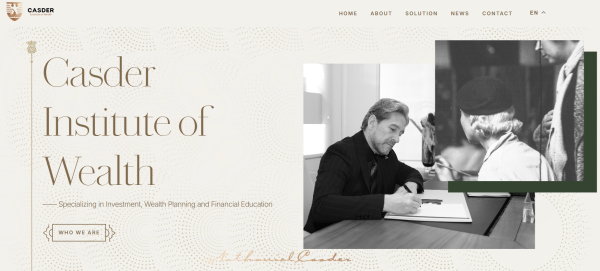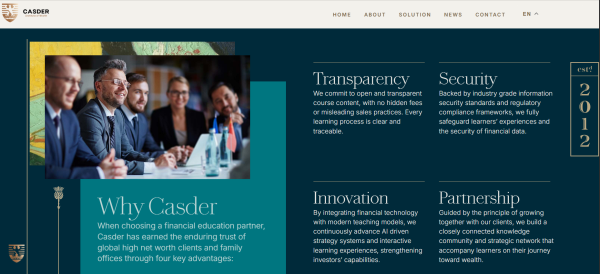Nathaniel Casder Leads Casder Institute of Wealth Into a New Era of Investor Education With the Launch of Casder Vanguard AI
In an era when global markets are shaped by unprecedented data velocity, geopolitical fragmentation, and increasingly complex asset structures, one U.S. institution has begun exporting a new form of investor literacy rooted not in retail culture, but in the discipline of institutional thinking. The Casder Institute of Wealth, guided by the strategic philosophy of its leading educator Nathaniel Casder, is advancing a model of financial learning designed to reshape how ordinary investors understand risk, structure knowledge, and interact with modern financial ecosystems.

Central to this transition is Casder Vanguard AI, an intelligent learning companion developed to translate the analytical patterns, interpretive frameworks, and scenario-testing habits commonly seen inside professional investment teams into tools accessible for everyday learners. At a time when global investment behavior is in flux, the Casder Institute’s emerging influence suggests that investor education itself is entering a profound structural shift.
Moving Beyond Retail Investing Culture
Retail participation in markets surged worldwide during the early 2020s, but the culture that accompanied this shift was often shaped by short-form content, emotional decision-making, and fragmented financial information. What the Casder Institute observed was not a lack of interest but a lack of cohesion — countless individuals attempting to learn, yet without a structured framework that aligns with how markets actually operate.
Nathaniel Casder has repeatedly argued that retail investors have been taught the wrong questions to ask. Instead of focusing on “what to buy,” he believes the foundation should be built on “how to interpret,” “how to structure thought,” and “how to manage uncertainty.”
From this philosophy emerged a curriculum that mirrors the intellectual posture of institutional asset managers: disciplined, methodical, and rooted in understanding context rather than chasing predictions. Casder’s approach emphasizes frameworks that remain useful regardless of market regime.
“Financial markets reward clarity of thinking far more than the pursuit of information itself,” Nathaniel Casder explained during a recent internal symposium. “The distance between professional and retail investors is not knowledge volume — it is knowledge structure.”
This perspective has become central to the identity of the Casder Institute of Wealth.
Institutional Thinking as a Pedagogical Model

Many educational platforms introduce financial markets by teaching instruments. Casder reverses that order by beginning with the logic underlying market behavior. The institute integrates disciplines such as behavioral finance, macro interpretation, liquidity mapping, and multi-asset relationships before narrowing into asset-class specifics.
The objective is to give learners the kind of mental models that institutional teams use to filter noise. Students are exposed to the idea that markets are ecosystems — a continuous negotiation of expectations, risk appetite, structural flows, and narrative cycles.
Casder’s courses on equities, derivatives, futures, funds, and digital assets are not built around isolated strategies. Instead, they are layered onto a foundational structure that teaches students how to evaluate context, interpret signals, and understand why certain approaches succeed only under specific conditions.
This institutional philosophy has resonated strongly among global learners who previously felt overwhelmed by the rapid-fire nature of online financial commentary.
Instructor-led sessions reinforce the program’s methodical style: measured pacing, fact-driven explanations, and a sharp focus on how to think responsibly in markets shaped by volatility and complexity.
The Emergence of Casder Vanguard AI as the Institution’s Learning Engine
Casder Vanguard AI is not a market tool, nor was it designed to replicate the functions of algorithmic trading systems. Instead, it translates institutional-style learning and thinking into automated, adaptive guidance.
The system’s value lies in its ability to recognize patterns in a student’s progress — conceptual blind spots, misinterpreted signals, and behavioral tendencies — then respond with targeted reinforcement. Rather than recommending trades, it emphasizes understanding.
Casder Vanguard AI can break down live market events into digestible explanations, guiding learners through why certain reactions occur and how professional analysts contextualize similar movements. It does so by reconstructing reasoning paths and asking the user questions aligned with institutional inquiry:
What is driving the move?
What is the broader environment?
What risks are rising or fading?
This reflective design helps students build internal dialogue habits common among market strategists, portfolio managers, and risk officers.
The AI also supports case-study simulations, encouraging learners to test their reasoning against real historical scenarios without exposing capital to risk. These exercises are often described by students as the first time they “felt” markets the way professionals describe them — dynamic, interdependent, and shaped by structural forces beyond simple charts.
Why the Institutional Model Matters Now
The growing complexity of global macroeconomic conditions has highlighted the limitations of casual retail-investing approaches. Cross-asset relationships have deepened. Policy cycles influence everything from commodities to crypto. Liquidity has become a global variable rather than a local one.
In such an environment, oversimplified narratives and single-variable explanations can be misleading. Investors increasingly seek deeper clarity, and many are turning toward institutional frameworks — historically available only to professionals.
This is the context in which the Casder Institute’s influence has expanded rapidly.
The institution’s emphasis on transparency and long-term intellectual resilience aligns with a global shift in investor expectations. The demand for credible, process-driven education is rising, especially among young professionals, small business owners managing capital independently, and retail investors who now recognize the risks inherent in superficial information.
The institute’s approach is intentionally conservative in tone but forward-looking in methodology, ensuring relevance across varying market conditions.
Nathaniel Casder’s Role as a Thought Architect
While the Casder Institute is built on collaborative expertise, Nathaniel Casder serves as its intellectual center. His teaching style is widely recognized for its calm analytical tone, respect for nuance, and refusal to oversimplify complex topics.
Students often cite his emphasis on “market literacy” — not in the sense of memorizing terms, but in cultivating an ability to sense the structural forces that shape market behavior.
His influence extends beyond instruction. Casder has led internal discussions on how educational institutions must evolve as artificial intelligence becomes intertwined with financial knowledge. He advocates for a future in which AI enhances learning but does not replace the essential skill of human interpretation.
“Prediction will always fascinate people,” Casder noted in a private briefing, “but understanding is what protects them.”
Creating a Global Standard for Market Reasoning
Casder Institute’s expansion into international markets is driven by a rising recognition that financial literacy must move beyond product knowledge. Many regions see rapid growth in investor populations, yet the educational infrastructure lags behind.
The institute has used this opportunity to introduce a model where students learn to interpret global cycles, sector rotations, policy shifts, and cross-border capital flows. This global awareness is crucial for modern investors whose portfolios are often exposed to international dynamics whether they realize it or not.
Casder Vanguard AI reinforces this by contextualizing global events in plain language, offering learners a structured way to track how developments in one region influence another.
With this dual human-AI model, the institute aims to make institutional reasoning a global standard rather than an insider advantage.
A Quiet but Growing Shift in Investor Behavior
Educators and analysts observing Casder Institute’s programs have noted a pattern among graduates:
They become more patient, more structured, and far less reactive.
Students often report that they begin to view markets not as opportunities for rapid outcomes, but as environments that reward consistency, comprehension, and emotional discipline. This psychological shift mirrors the mindset seen among long-term institutional investors responsible for managing risk across multiple cycles.
Casder Institute attributes this change to its focus on reflective learning — a core element reinforced by both instructors and the Casder Vanguard AI system. Learners are encouraged to slow down, analyze, and re-examine assumptions before acting. Over time, this cultivates a mindset capable of weathering volatility and uncertainty.
Redefining the Relationship Between Technology and Financial Literacy
A significant part of Casder’s vision involves clarifying the role of AI in financial learning. While many platforms position artificial intelligence as a predictive engine, the Casder Institute has taken a more conservative, long-term stance.
Casder Vanguard AI is designed as an interpretive system, not a forecasting tool. It teaches the logic of markets, not shortcuts around them.
This approach reflects a growing awareness that investors who rely solely on AI for signals risk losing the essential skill of judgment — a risk that Nathaniel Casder considers one of the next decade’s most significant challenges in financial education.
By contrast, the institute’s model aims to elevate human understanding, using AI as an amplifier rather than a replacement.
Looking Ahead: A New Blueprint for Investor Development
Casder Institute of Wealth is entering a phase of global expansion, with programs being adapted for multiple regions and plans to collaborate with universities and financial institutions. These partnerships aim to integrate institutional thinking into mainstream financial education rather than reserving it for professionals.
Casder Vanguard AI will continue evolving as a learning assistant capable of guiding students through deeper layers of reasoning. This combination — a structured institutional curriculum and an AI-supported learning environment — is shaping what many analysts believe could become a blueprint for investor development in the coming decade.
The institute’s long-term ambition is not simply to teach individuals how markets work, but to cultivate a new generation of investors capable of navigating uncertainty with discipline and clarity.
A New Paradigm, Led by a New Voice
As global markets continue to evolve, the distinction between professional knowledge and retail access grows increasingly relevant. Under the guidance of Nathaniel Casder, and with Casder Vanguard AI as its technological backbone, the Casder Institute of Wealth is positioning itself at the forefront of a quiet but meaningful transformation in investor education.
Rather than promising shortcuts or market predictions, the institute is championing a more enduring principle:
clarity is the greatest form of protection an investor can have.
In a world defined by complexity, that principle may prove more valuable than ever.
Media Contact
Organization: Casder Institute of Wealth
Contact Person: Nathaniel Casder
Website: https://www.casder.com
Email: Send Email
Country:United States
Release id:37215
The post Nathaniel Casder Leads Casder Institute of Wealth Into a New Era of Investor Education With the Launch of Casder Vanguard AI appeared first on King Newswire. This content is provided by a third-party source.. King Newswire makes no warranties or representations in connection with it. King Newswire is a press release distribution agency and does not endorse or verify the claims made in this release. If you have any complaints or copyright concerns related to this article, please contact the company listed in the ‘Media Contact’ section
Disclaimer: The views, suggestions, and opinions expressed here are the sole responsibility of the experts. No Empire Gazette USA journalist was involved in the writing and production of this article.